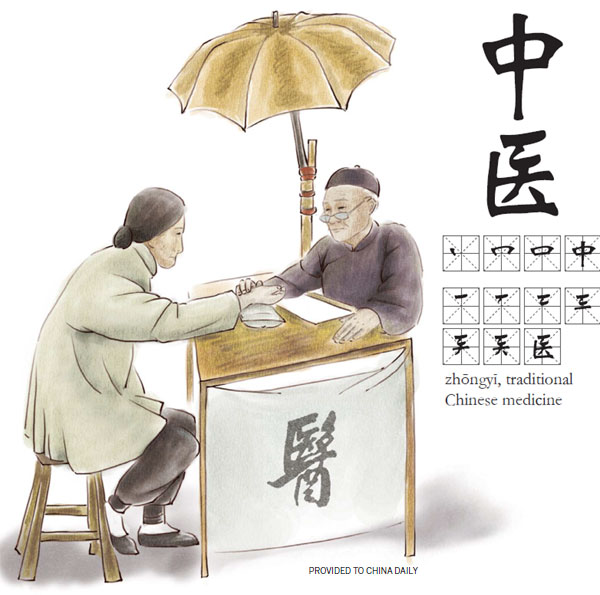TCM talk


How to whinge in Traditional Chinese Medicine terms 怎样在生活中使用中医的语言
If you feel unwell, it is not wise to simply say "I feel awful" to a Chinese person. Traditional Chinese medicine, although losing ground to modern medicine, still has a strong hold in modern Chinese society and how they look at their bodies. Some folks, for whatever reason, still cannot quite accept the modern scientific method for understanding the human body. Instead, many like the panacea of TCM that looks at all illnesses, from acne to cancer, attributing dysfunction and imbalance to unseen powers that dominate the body - yin, yang, fire, wind, qi, meridians, etc. Usually, the imbalance is caused by an unhealthy lifestyle or being unable to maintain a peaceful state of mind and falling victim to excessive anger, worry or greed.
Even Chinese people are often not really masters of describing their illnesses using TCM language which, after all, is ancient and complex. Most people only have vague ideas about yin and yang and use the term "fire" in the event of infections, knowing little more about acupuncter points than the average Joe. But, if you know the right terminology, you might just be able to impress the average practitioner. For example, if you only say, "I'm overworked and I feel awful", you may get an indifferent "oh really" at most; but if you say:
I feel like the circulation of my qi and blood is blocked due to long hours of work.
Wǒ gǎnjué gōngzuò guòjiǔ dǎozhì qìxuè bù tōng.
我感觉工作过久导致气血不通。
Or,
My yin is greatly undermined by my lack of sleep.
Shuìmián bùzú ràng wǒ yīnxū dě lìhài.
睡眠不足让我阴虚得厉害。
That will surely get you some wide-eyed stares of genuine concern, alongside some immediate recommendations for a powerful restorative remedy, like ginseng soup, to bring you back to life.
To start with the very basics of this language, you need to remember the biggest menaces to the human body in TCM - wind (风 fēng), chills (寒 hǎn) and humidity (湿 shī). One of these factors is inevitably responsible for any illness in TCM, so you can never be wrong. For example:
I'm suffering from chills/humidity in my knees.
Wǒ de xīgài yǒu hǎnqì/shīqì.
我的膝盖有寒气/湿气。
You will sound much more professional if you can add the word "evil" (邪 xié) as a suffix whenever you mention the words, such as "evil wind" (风邪 fēngxié), "evil chills" (寒邪 hǎnxié), and "evil humidity" (湿邪 shīxié).
The common cold is a typical case of your body being invaded by wind and chills - bacteria and viruses are mere phantoms of Western superstition. Colds basically come down to two major categories. The first is "a cold caused by chilly wind" (风寒感冒 fēnghǎn gǎnmào) that happens during the cold seasons. It can also, more conveniently, be called "a wind trauma"
(伤风 shāngfēng). The second is rather different: the " cold caused by hot wind" (风热感冒 fēngrè gǎnmào), which is a summertime ailment; it is usually the result of a drastic alternation between hot and cold. It it can sometimes be called a "hot wind trauma" (热伤风 rèshāngfēng).
Too much air-conditioning in the office and the high temperatures made me vulnerable to evil chills, giving me hot wind trauma.
Bàngōngshì kōngtiáo tài lěng, wàimiàn yòu tài rè, dǎozhì wǒ shòule hǎnxié, déle rè shāngfēng.
办公室空调太冷,外面又太热,导致我受了寒邪,得了热伤风。
Humidity, as the third most dangerous evil force threatening your health, does not mean you sweat too much. It is an abstract concept that refers to the humidity inside your body. Humidity causes the flow of meridians in your body to grow stagnant, repressing your yang. Its signs include a feeling of being shrouded in dizziness, heavy limbs, sore joints, yellow tongue, bad appetite, rash and obesity. Getting rid of humidity is called 祛湿 (qùshī).
I've eaten too much raw seafood and iced beer, so my body is heavy with humidity.
Wǒ chīle tài duō shēnglěng hǎixiān hé bīng píjiǔ, shéngtǐ shīqì hěn zhòng.
我吃了太多生冷海鲜和冰啤酒,身体湿气很重。
I feel very dizzy and heavy, and I cannot digest well. Do you know any food that's good for getting rid of my humidity?
Wǒ juéde hūnhūn chénchén, érqiě jīshí búhuà. Nǐ zhīdào chī shénme shíwù kěyǐ qùshī mā?
我觉得昏昏沉沉,而且积食不化。你知道吃什么食物可以祛湿吗?
Aside from these three must-knows, you can perfect your TCM talk by always mentioning you are suffering from weak yang (阳虚 yángxū) or weak yin (阴虚 yīnxū). There is no standard definition as to what these actually are, but if you are pale, sweaty, cold, listless and sleep a lot, you can basically refer to yourself as having weak yang.
If you are flushed, agitated, thinning and are having restless sleep, you can say you have weak yin. Nourishing the yin is called 滋阴 (zīyīn) and strengthening the yang is called 补阳 (bǔyáng). Note that when sexual health is involved, boosting your yang (壮阳 zhuàngyáng) means boosting your manly virility.
I want to have lamb hot pot because my yang is weak lately and needs reinforcement.
Wǒ xiǎngchī yǎngròu huǒguō, yīnwèi wǒ zuìjìn yǎngxū, xūyào hǎohao bǔbu.
我想吃羊肉火锅,因为我最近阳虚,需要好好补补。
My boyfriend has a weak kidney. What food can boost his yang?
Wǒ nánpéngyǒu shènxū, shénme shíwù kěyǐgěi tā zhuàngyǎng?
我男朋友肾虚,什么食物可以给他壮阳?
Last but not least, you have to know the word "fire" (火 huǒ). Acne, toothache, ulcers, inflamed tonsils and constipation are all typical symptoms that Chinese people attribute to having an inner fire (上火 shànghuǒ).
I'm having an inner fire, which brought my toothache back again.
Wǒ zuìjìn shàng huǒ, yáténg yòu fànle.
我最近上火,牙疼又犯了。
You can have fire in your organs. For example, a dry throat and coughing without phlegm indicates fire in the lungs (肺火 fèihuǒ). Liver is likely the most flammable organ, as it is believed that anger is the result of a strong fire in the liver.
Those easily enraged have a great fire in their liver.
ài shēngqì de rén gānhuǒ wàng.
爱生气的人肝火旺。
Finally to make yourself look more sociable, remember to apply your TCM observations in your greetings to show how you are concerned about the health of your acquaintances.
You look in the pink! Even your voice sounds strong.
Nǐ kànqǐlái qìsè búcuò a! Lián shuōhuà dōu zhōngqì shízú.
你看起来气色不错啊!连说话都中气十足。
Your face looks pale but your forehead looks dark. Did you drink until 5 o'clock in the morning again?
Nǐ kànqǐlái miànsè fā bǎi, yìntáng fāhēi, shì bú shì yòu hējiǚ hē dào zǎoshàng wǔ diǎnzhōng le?
你看起来面色发白,印堂发黑,是不是又喝酒喝到早上五点钟了?
You have had more white hair recently. You should eat more black sesame to nourish your kidneys.
Nǐ zuìjìn bái tóufa biàn duō le, yīnggāi duōchō hēizhīma búshèn.
你最近白头发变多了,应该多吃黑芝麻补肾。
Courtesy of the World of Chinese, www.theworldofchinese.com
The World of Chinese
(China Daily Africa Weekly 06/06/2014 page27)






























